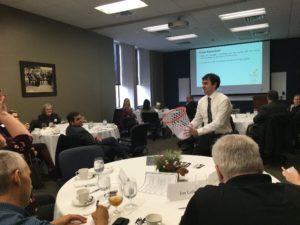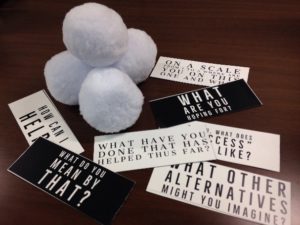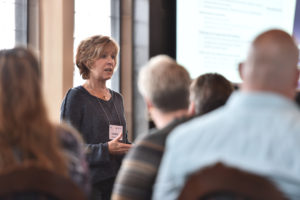Hello,

Hello,

In an effort to continue the coaching momentum in our division and inspired by the Sharpening Your Coaching Skills event held on Sept 12, Notre Dame Research (NDR) held two coaching lunches for our managers this winter. During these lunches, we had an invited speaker and a couple of activities that gave managers the opportunity to further practice their coaching skills in addition to a very special give away at the end of the workshop (like the ND Courage rock).
We kicked off the lunch with an invited speaker – Kristen Morin from OIT. She shared her coaching journey and talked about the initial struggles and successes she’s had. Our NDR managers greatly appreciated hearing about another manager’s point of view and experience with turning what she had learned into action.
After her talk, I introduced a special theme for the day – a snowball. In addition to being a perfect theme due to the weather, snowballs, like coaching skills, need to be built in order be effective. Good snowballs are not made with one handful of snow. Instead, snowballs take many handfuls of snow that need to be shaped and packed. Good coaches are not made with one training sessions. It takes multiple attempts, successes, failures and learning from others to build a good coaching skill set.
In the first practice activity, I asked each table to reflect and share best practices that they have used to continue their coaching momentum. At the conclusion of the table discussion, I asked the larger group what to share an idea they heard that they will start doing.

In the final activity, I posed coaching scenarios to managers (based on their own struggles) and asked them to “coach me through it” by blurting out powerful questions that they would ask if they were approached with the problem. I provided “stuck cards” on each table for inspiration should they have trouble thinking of a question. You wouldn’t believe how quickly open ended questions asked by the audience turned into “advice giving,” but I think this was also powerful for others to see that it is a habit many of us have when people approach us with a problem.
I closed out the lunch by giving all participants a snowball that they could take with them. I hope they use them at their desk as stress reliever or maybe as a reminder for them to push forward, coach and build their coaching snowball. If you are looking to have a similar activity in your area or division and have any questions about what we did at NDR , please feel free to reach out!
Andrew Brown
Operational Effectiveness, Assistant Program Director
Notre Dame Research
abrown20@nd.edu


Do you ever feel judged by your peers because your work/life balancing scale seems completely lopsided compared to theirs? For me, work is my life. I know, now you’re thinking of the movie The Shining and the words that were typed over and over again: “All work and no play makes Jack a dull boy.” Don’t get me wrong; I love being around my family and friends, who fill up my tank of joy, but my career encompasses much of my time and I am okay with that.
I must admit though that this is an area I’ve struggled with when interacting with others at work. The thought of tipping someone else’s work-life balance scale or even the appearance of that expectation tends to be the stress that gets to me most. Although I enjoy working at night in front of the television and sending off emails in rapid fire, I know for others this can be seen as an unwelcome intrusion into their personal time and can even lead to a feeling of inadequacy if they don’t respond promptly.
Going through Coaching for Greater Effectiveness, students learn that if you want a high performing team with meaningful relationships, you need to have both trust and candor. If someone on my team feels inadequate for not responding to my email at 10:00 at night, I haven’t been an effective coach. I need to be sensitive to my team members by letting them know I do not expect responses outside of normal business days/hours and then prove they can trust that statement by my subsequent actions.
The weights we put on our work-life scale are different for each of us and we must listen to our co-workers’ voices on what works best for them and the people depending on them. Building a foundation of trust begins by respecting your teammates’ decisions when it comes to their well-being.